| Article ID | Journal | Published Year | Pages | File Type |
|---|---|---|---|---|
| 2109126 | Cancer Epidemiology | 2013 | 7 Pages |
Abstract
Astrocyte elevated gene-1 (AEG-1) expression is increased in diverse human cancers and plays a vital role in tumorigenesis and progression. The aim of this study was to investigate the clinicopathologic features and prognostic significance of AEG-1 in squamous cell carcinoma of the tongue (TSCC). Immunohistochemistry (IHC) was performed to examine AEG-1 protein expression in paraffin-embedded tissues from 93 patients with TSCC. Real-time PCR and western blot analyses were employed to examine AEG-1 expression in 4 pairs of primary TSCC and adjacent non-cancerous tissues from the same patient. Immunohistochemical results revealed that the positive rate for AEG-1 in TSCC tissues (48.39%, 45/93) was higher than that in the normal tongue tissues (10.00%, 3/30) (PÂ <Â 0.001). These results were further confirmed between TSCC tissues and matched adjacent non-cancerous tissues by Western blot and RT-PCR. Simultaneously, AEG-1 protein level was positively correlated with differentiation degree (PÂ <Â 0.001), clinical stage (PÂ <Â 0.001), T classification (PÂ =Â 0.007) and N classification (PÂ =Â 0.012). Furthermore, patients with higher AEG-1 expression had shorter overall survival time. Multivariate analysis (Cox regression) also suggested that AEG-1 expression was an independent prognostic indicator for TSCC (PÂ =Â 0.043). Our results indicate that AEG-1 expression is closely associated with carcinogenesis and progression of TSCC, and may represent a novel and valuable predictor for prognostic evaluation of TSCC patients.
Related Topics
Life Sciences
Biochemistry, Genetics and Molecular Biology
Cancer Research
Authors
Zun-fu Ke, Shanyang He, Shuhua Li, Dongyuan Luo, Chongjin Feng, Wenwen Zhou,
